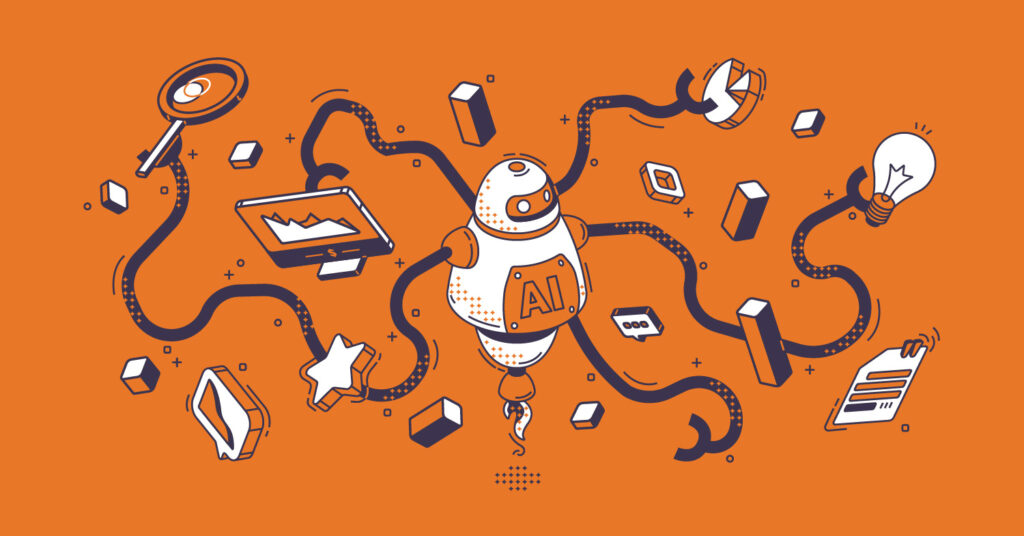
AI is viewed as the robots within your computer that track your digital footprint. There are many misconceptions about AI, and people are often scared of it due to their lack of knowledge surrounding the topic. With this, people are missing out on the fact that AI is a very useful tool with a lot of potential to make our lives much easier. With the marketing industry in mind, AI tools and technologies can make processes more efficient, organized, and boost business outcomes. We must first try to better understand it, learn to trust it, and lean into what it can offer to reap the benefits and use it to its full potential.
What is AI?
AI stands for Artificial Intelligence, and it is a process of programming technologies to learn from and pick up on patterns in collected data. This can be used, for example, in the algorithms of the social platforms you use, such as the “For You” page on TikTok. AI has the ability to process and recognize images and language, as well as make decisions and predictions, and even create content. AI works through the five steps of inputs, processing, outcomes, adjustments, and assessments. With these steps, data is collected and sorted, patterns are detected, the patterns are applied to consumer contexts to predict behavior and trends, the algorithms are altered to match data patterns, and finally assessing what insights, outcomes, and adjustments have been made and why.
Benefits of AI in Marketing:
One of the most notable benefits of using AI in digital marketing is the opportunity to create personalized customer experiences. AI can measure and predict purchasing patterns and preferences to tailor advertising to the customer’s needs. This ability to recommend products and services that align with customer behaviors and needs can lead to higher conversion rates and a stronger brand loyalty. These AI processes can also help companies to better understand their target audience, as well as provide predictions for market trends that can be utilized in advertising to the target market in an effective way. AI can identify the platforms most used by the target audience, the types of ads they are most drawn to, the type of content they most often engage with, and more! This can also help to speed up the content creation process through this consumer data being easily accessible.
Another major benefit of AI is its ability to digest and interpret large amounts of data in short amounts of time. This makes data analysis much faster and easier. AI can detect information that may be easily missed or overlooked through human analysis. The use of AI data analysis can also limit human errors that we sometimes see. The efficiency of AI is a necessary component when it comes to processing things like market research, making the entire process much more manageable and delivering results in a quicker manner.
Another area where we see AI taking the world by storm in customer service. It can be used in the form of chatbots, to make customer service more accessible through its 24/7 services. It is an efficient way to provide customers with support regarding simple inquiries such as FAQs, orders, recommendations, etc. For companies that put an emphasis on efficient customer service practices, this is a huge asset.
Challenges of AI in Marketing:
When it comes to the challenges with AI, firstly it is important to note that we are learning more about AI, its uses, and its processes each day. It could be an incredible tool for the world in the day of the digital age, but there is lots to understand about how it works and ways it can be used. We have currently only just begun to crack the surface of AI and all its uses and advantages.
One challenge of AI is integrating it with current systems in place. It can be hard to get a company to change its structures, and not all structures in place can easily adapt to the new digital tools. Additionally, there can be a learning curve with teaching the ins and outs related to these new technologies. It is important to first ensure that it is worth the costs and time it takes to integrate AI with your company’s existing frameworks. It is equally as important, if not more so, to put an emphasis on training to ensure employees are supported in the adaptation process.
Another obvious difficulty when it comes to AI is cost. AI systems can be extremely expensive depending on the complexity and size of the projects. While it has great benefits, it is important to consider the ROI before adopting AI to ensure it aligns with your company needs and goals and is worth the benefits it can deliver. However, it does have the ability to save your company money and time in the long run through its automation tools and by increasing productivity. Generally, it is a somewhat cost-effective investment, and I predict this trend will continue as it becomes more widely accepted.
Yet another problem with AI is its inability to be 100% accurate all the time. The systems can misinterpret data or provide false information. This is why any use of AI tools requires fact-checking prior to publishing to avoid these mistakes. With this, AI also poses the possibility of plagiarism as it could create content that closely resembles existing content. Again, it is important to double-check any work provided by AI. AI is not meant to replace the jobs of humans, but to be an additional tool to make our jobs easier and more efficient. Therefore, it is essential to remember to take be weary of the fact that it is not a perfect science.
Conclusion:
Overall, AI has the ability to greatly enhance digital marketing through making data processing easier, predicting trends, providing insight on customers, and providing content ideas. It is important to be mindful when using AI that it lacks consistency, so double-checking the provided work is always a good idea. Additionally, I would argue that AI is best utilized in conjunction with human work, not as a replacement for it. AI technologies lack a human touch, so using AI as a starting point plus adding a personal touch makes it more digestible and relatable for the target audience.
Sources:
https://blog.hubspot.com/marketing/ai-social-media-strategy
https://www.coursera.org/articles/how-does-ai-work
https://zerogravitymarketing.com/blog/impact-of-artificial-intelligence-on-digital-marketing/

Recent Comments